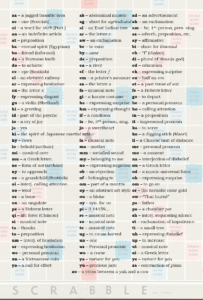I recently finished reading David Foster Wallace’s book Infinite Jest (1996), and I am exhausted. It seemed that every page I read on average contained some word I could not define, even using context clues. Ryan Compton estimates that “Wallace used a vocabulary of 20,584 words to write Infinite Jest.” This vast vocabulary contains jargon, archaisms, neologisms, and all-around sesquipedalia—long, polysyllabic words—that almost no one uses in daily conversations. Visualizing situations in which you might need to use some of these words itself is a chore for the imagination, unless you too are planning to write a mind-melting maximalist novel or simply want to add more ammunition to your Scrabble arsenal. “That’s cachexia for 284 points, dude!”

All language learners face the challenge of developing their vocabulary to achieve fluency. It is one thing to know where certain types of words ought to go in a sentence (syntax), but it is another to find the exact words to plug into a sentence in a conversation or other form of communication. Learners often know what they want to say in another language, but they may not know the exact word to help them say it in the target language. A lack of vocabulary often leads to a reliance on circumlocution, or using words we do know to describe the thing or concept we do not know, either as a conversational strategy or a coping mechanism.
 Reading is a great way to increase vocabulary. Reading alone is not going to make anyone fluent in all four skill areas (reading, writing, listening, and speaking), but it can provide a rich source of comprehensible input. (Much of Infinite Jest does not even begin to approach what Stephen Krashen would call “i + 12,” let alone “i + 1.”) When learners encounter unknown words in books, articles, or other publications, they can use any number of strategies to bring that word into their personal lexicon.
Reading is a great way to increase vocabulary. Reading alone is not going to make anyone fluent in all four skill areas (reading, writing, listening, and speaking), but it can provide a rich source of comprehensible input. (Much of Infinite Jest does not even begin to approach what Stephen Krashen would call “i + 12,” let alone “i + 1.”) When learners encounter unknown words in books, articles, or other publications, they can use any number of strategies to bring that word into their personal lexicon.
-
-
- Look up the word in a dictionary and read the definition out loud
- Use the immediate context in the passage to make sense of the word
- Write down the word in a notebook as part of a vocabulary list and drill yourself on the word and its meaning
- Use the word in other sentences, either written or spoken, and in other situations or contexts
-
Even individuals who have spoken a language for many years encounter words they do not recognize from time to time. According to a BBC article, a typical “native speaker” only knows about 15,000–20,000 word families, but English contains many more word families or “lemmas” than that. No one can be a master of all domains of linguistic usage, so someone like me with an advanced degree in English will constantly run across new words through reading different types of material. That does not mean we should shoot to hang around the average. Knowing more words than we need to use in our daily personal and professional lives can enrich our worldviews and help us make connections and associations that lead us down new avenues of thought. In short, it makes us well-rounded, broader-minded people.
In this article, I had originally intended to provide my own new vocabulary list—which is something I used to do in my university German courses—based on my own reading of Infinite Jest. The list would consist of words like Kekuléan and presbyopic and espadrilles, as well as numerous drug-related terms. However, I am still compiling that list and may be at it for the foreseeable future. Numerous other people have already compiled their own online Infinite Jest word lists, though, so I am providing links to those resources. Feel free to use them to sate your curiosity, increase your own vocabulary, or at the very least–if you’re at all like me–pad your Scrabble scores.
“Over 200 Words Collected from Infinite Jest” (Rob Hoffman)
“Infinite Jest Vocabulary” (Ben Zimmer)
“What David Foster Wallace Circled in His Dictionary” (Slate)
“Words from Infinite Jest” (Grant Barrett)
“Infinite Jest: David Foster Wallace”
“Words David Foster Wallace Circled in His Dictionary That Were Used in Infinite Jest (And Where They Appear)” (DFW Words)
This post was previously published on our site in 2020 and is appearing here as part of website makeover. ~ Jeff Howard
